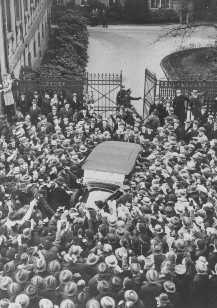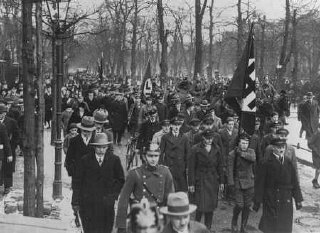Sorry. His Party won a Democratic Election. He was the head of the Party.He did not get elected democratically. Sorry to disappoint you.
Reasons why Hitler rose to power
- Hitler was a great speaker, with the power to make people support him.
- The moderate political parties would not work together, although together they had more support than the Nazis.
- The depression of 1929 created poverty and unemployment, which made people angry with the Weimar government. People lost confidence in the democratic system and turned towards the extremist political parties such as the Communists and Nazis during the depression.
- The Nazi storm troopers attacked Hitler's opponents.
- Goebbels' propaganda campaign was very effective and it won support for the Nazis. The Nazis targeted specific groups of society with different slogans and policies to win their support.
- Hitler was given power in a seedy political deal by Hindenburg and Papen who foolishly thought they could control him.
- German people were still angry about the Treaty of Versailles and supported Hitler because he promised to overturn it.
- Industrialists gave Hitler money and support.
- The government was in chaos. President Hindenburg dismissed Brüning in 1932. His replacement - Papen - lasted six months, and the next chancellor - Schleicher - only lasted two months. Hindenburg had to use Article 48 to pass almost every law.
- Hitler handed power on a plate
In January 1933, Hindenburg and Papen came up with a plan to get the Nazis on their side by offering to make Hitler vice chancellor. He refused and demanded to be made chancellor. They agreed, thinking they could control him.
In January 1933, Hitler became chancellor, and immediately set about making himself absolute ruler of Germany using Article 48
[h=1]HITLER COMES TO POWER[/h]
 A crowd cheers Adolf Hitler as his car leaves the Reich Chancellery following a meeting with President Paul von Hindenburg. Berlin, Germany, November 19, 1932.
A crowd cheers Adolf Hitler as his car leaves the Reich Chancellery following a meeting with President Paul von Hindenburg. Berlin, Germany, November 19, 1932.— National Archives and Records Administration, College Park, Md.
- [h=2]VIEW PHOTOGRAPHS[/h]

- [h=2]VIEW MAP[/h]

In the early 1930s, the mood in Germany was grim. The worldwide economic depression had hit the country especially hard, and millions of people were out of work. Still fresh in the minds of many was Germany's humiliating defeat fifteen years earlier during World War I, and Germans lacked confidence in their weak government, known as the Weimar Republic. These conditions provided the chance for the rise of a new leader, Adolf Hitler, and his party, the National Socialist German Workers' Party, or Nazi party for short.
Hitler was a powerful and spellbinding speaker who attracted a wide following of Germans desperate for change. He promised the disenchanted a better life and a new and glorious Germany. The Nazis appealed especially to the unemployed, young people, and members of the lower middle class (small store owners, office employees, craftsmen, and farmers).
The party's rise to power was rapid. Before the economic depression struck, the Nazis were practically unknown, winning only 3 percent of the vote to the Reichstag (German parliament) in elections in 1924. In the 1932 elections, the Nazis won 33 percent of the votes, more than any other party. In January 1933 Hitler was appointed chancellor, the head of the German government, and many Germans believed that they had found a savior for their nation






